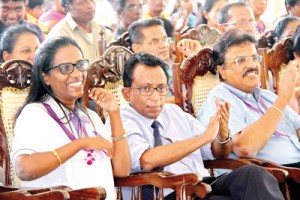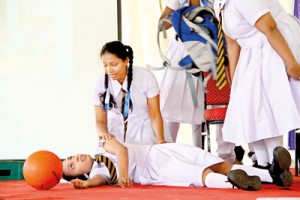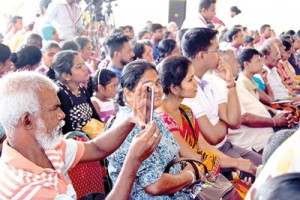News
‘Don’t make able- bodied people disabled’

Members of the Civil Security Department act out ‘Epilepsy in the workplace’ to dispel stigma. Pix by Indika Handuwala
They came in their numbers to Campbell Park in Borella. No it was not a May Day rally with red flags a-flutter but the commemoration of World Epilepsy Day to give out a loud and clear message.
‘Epilepsy is like any other disease. It is controllable. Men, women and children with epilepsy can lead a normal life. Don’t discriminate against those with epilepsy. Don’t stigmatize those with epilepsy.’
Organised by the Epilepsy Association of Sri Lanka headed by Consultant Paediatric Neurologist Dr. Jithangi Wanigasinghe, the Sunday morning session was replete with activity to drive home an important message. “Don’t marginalise and stigmatise those living with epilepsy.”
Among those who graced the occasion and felt the emotion of families dealing with epilepsy through ‘Our story’ told by two children, while smiling at the triumph of ‘How I won over epilepsy’ effectively told by a sportswoman, were Health Minister Dr. Rajitha Senaratne, representatives from the Social Services and Empowerment Ministry and many eminent doctors.
Usually World Epilepsy Day is celebrated on the second Monday of February which was the 13th, but Sri Lanka chose to hold the major Epilepsy Awareness Programme a day before at Campbell Park on Sunday the 12th to enable wider participation.
Comparing epilepsy to asthma, Dr. Wanigasinghe said that while it affects a person’s functional capacity, those with epilepsy do not suffer such a disability. If we look after those living with epilepsy, the disease can be controlled in a majority, as many as 70% and they can lead a relatively normal life. Even in the other 30%, although the disease may not be totally controlled, other measures could give them a better quality of life. If they have been prone to 12 seizures per year and that number has been drastically cut to 2 per year, they can contribute much to society. If the seizure time has been cut from 30 minutes to five minutes, the outcome has improved vastly.
The world has about 60 million people with epilepsy and Sri Lanka is estimated to have around 200,000, she said, stressing that quite a lot are otherwise normal people.
But, said Dr. Wanigasinghe, the people with epilepsy face a double burden. The disease as well as the stigma that goes with it and leads to men, women and children being marginalized and discriminated against in schools, workplaces, society and in the public eye. Epilepsy is considered a disability, but that is a misconception. They are physically normal and they should take their rightful place in the workforce, when their condition is controlled. “Don’t’ make these able-bodied people, disabled,” was her plea.

A skit brings about laughter and applause from the audience which included (from left) the President of the Epilepsy Association of Sri Lanka, Dr. Jithangi Wanigasinghe; the President of the Sri Lanka College of Paediatricians, Dr. LakKumar Fernando and Consultant Neurosurgeon Dr. Sunil Perera
“All of us who are part of their treatment process like doctors, nurses and pharmacists should strive to make them inclusive in society,” she said, pleading with school authorities including teachers and principals not to turn children away from the classroom door or the school gate. Give them a little leeway. If the child is sleepy, let him sleep and when he wakes up let him get back to his lessons. Don’t send him home.
A strong appeal also went out from her to policy-makers to help improve the lives of those living with epilepsy, to make their quality of life better. Medications for the treatment of epilepsy are available in hospitals, but there is a need to increase the options available for those having refractory epilepsy which is more difficult to treat. “We need to provide them with some special investigations such as genetic studies and blood tests and I believe we can very well do so because their numbers are small,” said Dr. Wanigasinghe.
The awareness programme also included a talk by Dr. Ravindra Kelanithilaka on ‘Improved care and social support for epilepsy’ and two stage dramas titled ‘Epilepsy can be treated’ by the Ampara Nurses’ Training School and ‘Epilepsy in the workplace’ by the Civil Security Department respectively.

‘Epilepsy can be treated’ is the strong message from the Ampara Nurses’ Training School

The audience engrossed with the activities on the stage
| Dispel ‘demon’ links Referring to false beliefs linking epilepsy with ‘yaka gahapu ledak’ (brought about by demons), Dr. Jithangi Wanigasinghe requested that such thinking should be dispelled effectively. People with epilepsy must be empowered to trust the system and take their medications, without going behind gurukam, charms and sutra. Otherwise, there will be poor medication compliance and we will not be able to make them better, she added.
|
Pix by Indika Handuwala (See also MediScene)

